JACKSON – Catholic Charities has set the tenth annual Bishop’s Ball for Saturday, June 6, at the Country Club of Jackson. The ball gives the organization an opportunity to recognize and honor some of its most loyal and dedicated supporters and this year is no exception.
Archie R. McDonnell Jr., of Citizens National Bank of Meridian and Beth and Robert Gaston of Madison are this year’s honorees.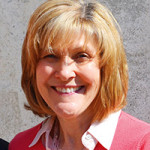
The Gastons are active members of Madison St. Francis of Assisi as extraordinary ministers of the Eucharist, RCIA program volunteers, and members of the choir and sacristy committee. Robert Gaston is currently serving as a lector and is an active member of Council 9543 of the Knights of Columbus. Beth Gaston is the coordinator of the marriage preparation ministry for the parish and involved in the parish ladies auxiliary as well as the St. Dominic’s Hospital Auxiliary. The Gastons have been active in supporting multiple projects at Catholic Charities where Beth has also served on the Board of Directors. They are lifetime members of the Catholic Foundation.>
The couple has also supported building projects at their home parish, Flowood St. Paul, St. Catherine’s Village, St Anthony and Madison St. Joseph Schools. Finally, the Gastons have supported the development of technology at several of the Catholic schools in the diocese. They have four children and nine grandchildren and have been married for 41 years.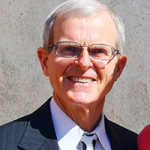
Archie McDonnell, Jr., President and CEO of Citizens National Bank, doubled the bank’s asset size from $500 million to more than $1 billion, and helped grow the Bank to 26 locations since taking the helm in 1999. In 1991, he helped to establish the East Mississippi Community Development Corporation through which local banks join together to provide funding to small businesses who do not qualify for traditional financing, and he continues to serve on the Board of the Corporation.
As a board member of the William Robert Baird Charitable Trust, he has ensured that more than $4.3 million in charitable donations have been made to underprivileged people in the area since 1981. In addition, the majority of the bank’s radio advertising dollars are invested 12 months out of every year, to promote the work of non-profit organizations throughout the state.
He also serves on the Strategic Planning Advisory Council for FIS, the world’s largest provider of banking and payments technology solutions, is a board member for the Meridian Symphony Association, and is also a member of the Bank CEO Network.  In 2012, the University of Mississippi’ School of Banking and Finance recognized McDonnell as their Distinguished Alumnus of the Year, and in 2013, he was honored with the Hartley D. Peavey Award for Entrepreneurial Excellence.
In 2012, the University of Mississippi’ School of Banking and Finance recognized McDonnell as their Distinguished Alumnus of the Year, and in 2013, he was honored with the Hartley D. Peavey Award for Entrepreneurial Excellence.
McDonnell is a long-time member of Central United Methodist Church in Meridian, where he serves as church treasurer. He and his wife of 39 years, the former Mary McCauley, are parents of a son, two daughters and six grandchildren, with another grandchild on the way. The Gastons and McDonnell will be honored at the June event.
The evening includes dinner and live entertainment as well as both live and silent auctions. The auctions are known for their fine art, decorative items from John Richard Furniture, jewelry, gift cards, trips and so much more! One of the most popular parts of the auction are the raffle packages.
The Bishop’s Ball is Catholic Charities premier fundraising event and helps to raise money for children’s programs. Cocktails start at 6:30 and dinner is at 7:15. Tickets cost $75 per person and are available on the website, www.catholiccharitiesjackson.org or through Julie O’Brien. Contact O’Brien by phone at (601)326-3758 or email julie.obrien@catholiccharitesjackson.org.
Monthly Archives: May 2015
Office of youth ministry offers Home Work summer service trip
TUPELO – Youth from across the Diocese of Jackson are invited to do a little home work this summer. The Home Work Mystery Mission trip is set for June 15-19. Applications are due May 15. Teens will stay in the Parish Life Center of St. James Parish, but will take trips throughout northeast Mississippi to do service work during the week.
There are service trips available out of state, but Home Work gives young people an opportunity to make an impact in their own communities and bond with other Catholics from Mississippi.
During last year’s Home Work trip there was plenty of service work to complete. A series of deadly tornadoes swept through Tupelo, Louisville and nearby communities on April 28, 2014. When the teens arrived in June they were able to help with cleanup and repairs.
Therese Seghers, youth minister for Greenville St. Joseph Parish, detailed some of the projects in an email to the paper. “Last year we visited/volunteered at a nursing home, we did yard work for churches and those in need, we helped with tornado damage cleanup, we worked with the soup kitchen for the homeless, and we worked with the St. Vincent de Paul Society. We will be adding on some additional projects this year,” she wrote.
Seminarian Mark Shoffner went last year. He said he loved being able to meet teens from all over the diocese. “I saw many of them again at Abbey Youth Fest and at the Cross Connections conference. It made the diocese seem a little less spread-out,” he said. He said while the work was hard, no one needs to come with special skills, just willing hearts and hands.
The program also includes spiritual reflection and opportunities for liturgy. This year each day will have a mystery theme to be revealed during the trip.
Home Work is open to teens who completed grades ninth through 12th this past school year. The cost is $75 per person.
Applications are available on the youth page of the diocesan website: www.jacksondiocese.org or by contacting Kathie Curtis, coordinator of the Office of Youth Ministry, 601-949-6934, or Kathie.curtis@jacksondiocese.org.
Peter Claver council honors community leaders
St. Dominic’s receives grant to purchase emergency smart device application
 JACKSON – St. Dominic’s Hospital has received a grant from Astra Zeneca to purchase a smart device application known as Pulsara that provides real-time interaction between field emergency personnel and the hospital’s critical care team. St. Dominic’s will be the first hospital in Mississippi to use this groundbreaking communication platform.
JACKSON – St. Dominic’s Hospital has received a grant from Astra Zeneca to purchase a smart device application known as Pulsara that provides real-time interaction between field emergency personnel and the hospital’s critical care team. St. Dominic’s will be the first hospital in Mississippi to use this groundbreaking communication platform.
With this application, emergency workers can enter critical information about patients who are having cardiovascular or stroke emergencies. The patient’s information is then sent to alert the hospital’s emergency department before the patient’s arrival.
“This process is extremely monumental in decreasing cardiovascular disease mortality rates,” said Christy McGregor, RN, BSN, Coordinator for St. Dominic’s Level 1 Heart Attack Program. “The Pulsara communication model will help decrease door-to-balloon times for ST-Elevation Myocardial Infarction (STEMI) and stroke patients. These decreased times translate to better outcomes for our patients, including less time spent in the hospital, quality of life and mortality.”
Brunini retires after 44 years of service to St. Dominic’s
When the Dominican Sisters of Springfield, Illinois, first began to contemplate the purchase of The Jackson Infirmary in 1945, they reached out for advice to then Monsignor Joseph Brunini of the Natchez Diocese, later named bishop of the Natchez-Jackson Diocese. That initial conversation led to a friendship between St. Dominic’s and the Brunini family that has lasted nearly seven decades.
And now, after more than 44 years of service to the hospital, Bishop Brunini’s nephew, Edmund L. (Eddie) Brunini Jr., has retired.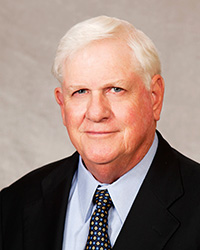
Eddie’s father (brother to Bishop Brunini) and his partner Gordon Grantham contributed their time to providing direction and legal counsel to the Dominican Sisters for many years prior to Eddie graduating law school, recalls Eddie Brunini.
“Gordon was providing his counsel as a nice thing for the Sisters and the hospital but was not really spending a lot of time with them,” said Brunini. “I had just started practicing law and didn’t have much to do with the hospital at that point. Sister Josephine was in charge and one day she stopped me and said, ‘I am going to have a real lawyer here. If you want to be the real lawyer, fine. If not, I will go get somebody else.’”
Sister Josephine was certainly grateful for the counsel she had received over the years, but she was ready to have a more full-time legal presence, recalls Eddie.
“Eddie was a rookie lawyer not long after I first came to St. Dominic’s,” said Sister Dorothea Sondgeroth, associate executive director of the St. Dominic Health Services Foundation. “Even in those early years of his career, he always gave us solid advice and was always available when we needed legal counsel.”
“We often said, when we had big issues, ‘What would Eddie Brunini say?’ And we often turned to him with difficult and challenging issues that confronted us,” said Claude Harbarger, president of St. Dominic Health Services. “He also had the confidence of the Dominican Sisters in Springfield. They knew they would get objective, good information, always with the best interest of St. Dominic’s and the Dominican Sisters at heart.”
“It is very unusual to find someone like Eddie who has served as an attorney for one organization for so long,” said Lester Diamond, president of St. Dominic Hospital. “He has had other areas of practice, oil and gas among them, but much of his time was spent with St. Dominic’s. We have been fortunate to have that dedication from him.”
Sister Sondgeroth also commented on how Brunini had a talent with people and with interjecting levity to help relieve tension.
“I remember one time we were in a long meeting and Eddie just stood up, got in a golf stance and began swinging an imaginary five iron as though he wished he was on the golf links instead of in the meeting,” she said. “It made us all laugh and came at just the right time to cue us to make a decision and adjourn.”
“He has a very likable personality,” said Harbarger. “He is a master storyteller, and his stories were always well received. He brought a lot of laughter with him in an upbeat way.”
New Format for Spring Hill College Master of Theology
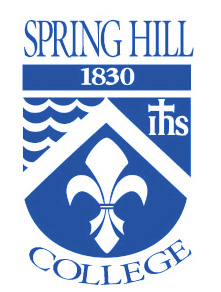 MOBILE, Ala. – Spring Hill College (SHC) has redesigned its Master of Theological Studies, (MTS) Master of Pastoral Studies (MPS) and Master of Arts (MA) degrees in a new blended format of on-line courses and in-classroom experiences. More than 30 years ago Spring Hill College offered its first graduate degree program in the Diocese of Jackson and since then numerous Mississippians have earned Master of Theology degrees from SHC. The school also offers extension classes in Atlanta and Birmingham.
MOBILE, Ala. – Spring Hill College (SHC) has redesigned its Master of Theological Studies, (MTS) Master of Pastoral Studies (MPS) and Master of Arts (MA) degrees in a new blended format of on-line courses and in-classroom experiences. More than 30 years ago Spring Hill College offered its first graduate degree program in the Diocese of Jackson and since then numerous Mississippians have earned Master of Theology degrees from SHC. The school also offers extension classes in Atlanta and Birmingham.
Spring Hill is still committed to this mission. In response to a desire from students not near the centers of Jackson, Birmingham, Mobile and Atlanta, Spring Hill has redesigned its graduate theology programs to be accessible to more people in more areas. The new program will require students entering the program to take at least three Level I courses, which are hybrid courses requiring just one six-hour in-classroom session on a Saturday in either Mobile or Atlanta.
After completing these courses, the student will take fully on-line Level II courses. While taking Level II courses, and before completing their program, students will be required to attend three graduate seminars. These seminars will meet in Mobile and Atlanta for one overnight stay from Friday evening to Saturday afternoon or Saturday noon through Sunday noon.
Students from anywhere in the southeastern U.S. would only have to travel to Mobile or to Atlanta six times in total during the course of the entire program. Both the MTS and MPS require a total of 33 credit hours. The MA requires 48 and builds on the MTS degree.
This new blended program allows students to earn an academically rigorous theology degree in the convenience of their own home and time schedule. At the same time, the program provides targeted in-classroom meetings for the students in the program to build a learning community with other students and with the faculty.
Faith Formation office announces lay ministry retreat
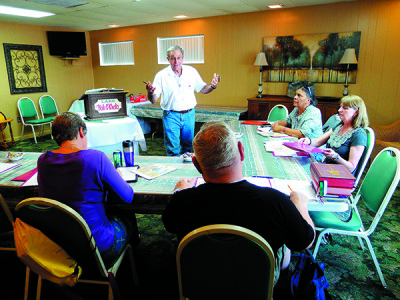
Marvin Edwards, lay ecclesial minister for Winona Sacred Heart Mission taught a class on lay reflecting in 2014. (Mississippi Catholic file photo)
Once a year the Office of Faith Formation invites pastors, lay ecclesial ministers, pastoral ministers, and other parish leaders to a retreat and workshop series as part of their continuing formation. This year the events will be at Lake Tiak O’kahata Sunday, June 7, through Thursday, June 11.
There are actually three events within the week, a two-day retreat, an optional extended retreat and a four-day workshop. The retreats follow the 2015 Catechetical theme “safeguarding the dignity of every human person.”
The workshops are part of a five-year certification program for lay ministers. Once someone starts working at a parish they apply to enter the Lay Ministry Formation program. Each year they take a workshop which builds on the one they took the year prior covering topics such as effective communications in ministry, balancing programs, canon law and more.
“One cannot overstate the value of this program for lay ministers in a diocese such as ours,” said Fran Lavelle, director of the Department of Faith Formation.
“The opportunity to meet, share, pray and learn with other Catholic lay people is in itself a great gift. We have folks who are sad when they complete the program because they value the community built over the five years,” she said.
Participants can register for different combinations of the three events. The cost of the Pastoral Ministries Retreat, which is from the afternoon of Sunday, June 7, at 3 p.m. through midday Monday, June 8, is $120.
The extended retreat, which begins Monday, June 8, after lunch through Thursday, June 11, after lunch, costs $400. A combination of the two retreats is available for a reduced rate of $485.
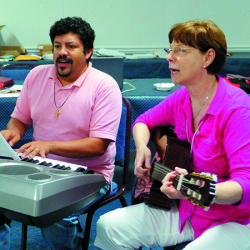
Edgar Hernández and Maureen Roberts provide music for the 2014 retreat. (Mississippi Catholic file photo)
The Pastoral Ministries Workshop which also begins Monday, June 8, after lunch is $500. Participants may combine the Sunday/Monday retreat with the Pastoral Ministries Workshop for a reduced combo rate of $585.
The cost includes lodging and meals. The department offers scholarships. Registrations are due by Friday, May 15. Download registration forms from the Faith Formation page on the website or contact Annette Stevenson, 601-960-8470, annette.stevenson@jacksondiocese.org.
Who am I to judge?
IN EXILE
By Father Ron Rolheiser, OMI
Perhaps the single, most-often quoted line from Pope Francis is his response to a question he was asked vis-à-vis the morality of a particularly-dicey issue. His infamous-famous reply: Who am I to judge?
Although this remark is often assumed to be flighty and less-than-serious; it is, in fact, on pretty safe ground. Jesus, it seems, says basically the same thing. For example, in his conversation with Nicodemus in John’s Gospel, he, in essence, says: I judge no one.
If the Gospel of John is to be believed, then Jesus judges no one. God judges no one. But that needs to be put into context. It doesn’t mean that there aren’t any moral judgments and that our actions are indifferent to moral scrutiny. There is judgment; except it doesn’t work the way it is fantasized inside the popular mind. According to what Jesus tells us in John’s Gospel, judgment works this way:
God’s light, God’s truth, and God’s spirit come into the world. We then judge ourselves according to how we live in the face of them: God’s light has come into the world, but we can choose to live in darkness. That’s our decision, our judgment. God’s truth has been revealed, but we can choose to live in falsehood, in lies.
That’s our decision, our judgment to make. And God’s spirit has come into the world, but we can prefer to live outside that spirit, in another spirit. That too is our decision, our judgment. God judges no one. We judge ourselves. Hence we can also say that God condemns no one, though we can choose to condemn ourselves. And God punishes no one, but we can choose to punish ourselves.
Negative moral judgment is self-inflicted. Perhaps this seems abstract, but it is not. We know this existentially, we feel the brand of our own actions inside us. To use just one example: How we judge ourselves by the Holy Spirit.
God’s spirit, the Holy Spirit, is not something so abstract and slippery that it cannot be pinned down. St. Paul, in the Epistle to the Galatians, describes the Holy Spirit in terms so clear that they can only be rendered abstract and ambiguous by some self-serving rationalization.
So as to make things clear he sets up a contrast by first telling us what the Holy Spirit is not. The spirit of God, he tells us is not the spirit of self-indulgence, sexual vice, jealousy, rivalry, antagonism, bad temper, quarrels, drunkenness or factionalism. Anytime we are cultivating these qualities inside of our lives, we should not delude ourselves into thinking we are living in God’s spirit, no matter how frequent, sincere or pious is our religious practice. The Holy Spirit, he tells us, is the spirit of charity, joy, peace, patience, kindness, goodness, trustfulness, gentleness and chastity. Only when we are living inside of these virtues are we living inside God’s spirit.
So then, this is how judgment happens: God’s spirit has been revealed. We can choose to live inside the virtues of that spirit or we can choose to live instead inside their opposites. One choice leads to a life with God, the other leads away from God. And that choice is ours to make; it doesn’t come from the outside. We judge ourselves. God judges no one. God doesn’t need to.
When we view things inside this perspective it also clarifies a number of misunderstandings that cause confusion inside the minds of believers as well as inside the minds of their critics. How often, for instance, do we hear this criticism: If God is all-good, all-loving and all-merciful, how can God condemn someone to hell for all eternity? A valid question, though not a particularly reflective one. Why? Because God judges no one; God punishes no one.
God condemns no one to hell. We do these things to ourselves: We judge ourselves, we punish ourselves and we put ourselves in various forms of hell whenever we do choose not to live in the light, the truth and inside God’s spirit. And that judgment is self-inflicted, that punishment is self-inflicted and those fires of hell are self-inflicted.
There are a number of lessons in this. First, as we have just seen, the fact that God judges no one, helps clarify our theodicy, that is, it helps deflate all those misunderstandings surrounding God’s mercy and the accusation that an all-merciful God can condemn someone to eternal hellfire. Beyond this, it is a strong challenge to us to be less judgmental in our lives, to let the wheat and the darnel sort themselves out over time, to let light itself judge darkness, to let truth itself judge falsehood and to, like Pope Francis, be less quick to offer judgments in God’s name and more prone to say: “Who am I to judge?”
(Oblate Father Ron Rolheiser, theologian, teacher and award-winning author, is President of the Oblate School of Theology in San Antonio, TX.)
St. Joseph Catholic Schools united
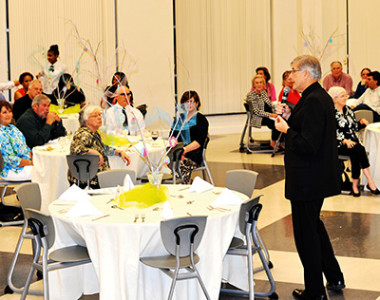
Bishop Joseph Kopacz spoke at the April 9 plan unveiling at Greenville St. Joseph School about uniting the two campuses.
GREENVILLE – Our Lady of Lourdes elementary school will soon relocate from East Reed Road to 1501 V.F.W. Road, creating a unified
campus for St. Joseph Catholic School System.
The move is scheduled for the 2015-2016 school year, with construction slated to begin later this spring, according to an April 9 unveiling of plans for the unified campus. Bishop Joseph Kopacz was on hand for the celebration and said he thinks this merger will be good for both school communities.
“It’s time to upgrade our elementary school facilities. Our students at Our Lady of Lourdes deserve the very best, and this new school will provide them with a Catholic education in state-of-the-art facilities,” said Michelle Gardiner, Our Lady of Lourdes Principal.
The school will add classrooms to the south side of the existing St. Joseph structure. Four classrooms will be added to the high school wing to accommodate middle school students alongside their high school counterparts. In addition, a two-classroom addition for Pre-K and kindergarten will complete the new elementary school wing. Additional restrooms, a resource room, an elementary library and a new playground for elementary students are also included in the construction plans.
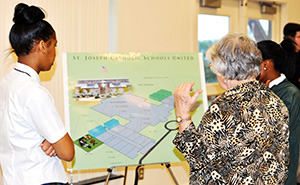
Students and supporters look at plans to add classrooms to St. Joseph to accommodate Our Lady of Lourdes students.
Tuition rates will not increase as a result, according to Gardiner. The move is being funded by the St. Joseph Catholic Schools Capital Campaign and donations are welcome.
For more information and sponsorship opportunities, contact St. Joseph Development Director Doreen Muzzi at 662-402-8137 or by email at fundraising@stjoeirish.org.
Parishes introduce Spanish formation program
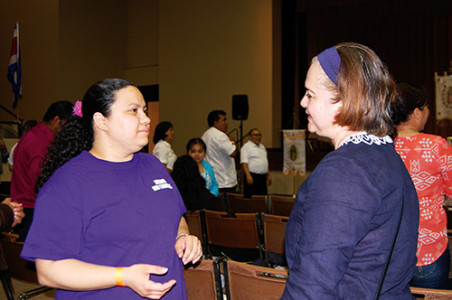
GREENWOOD – Maribel Sánchez (left) talks with Danna Johnson during the Hispanic Encuentro at the Civil Center Saturday, April 18. (Photo by Elsa Baughman)
By Elsa Baughman
PONTOTOC/HOUSTON – Six Hispanics from St. Christopher Mission and four from Houston Immaculate Heart of Mary Parish have just completed an online theological formation course using a new program called CAMINO. This program is offered in Spanish through the collaboration of the Southeast Pastoral Institute (SEPI) and STEP, the Satellite Theological Education Program of the University of Notre Dame.
For Maribel Sánchez, a member of St. Christopher Parish, it was very convenient to study from the comfort of her home and during the time most suitable for her. During a telephone conversation she said she believes that God does not always choose knowledgeable people to serve him but that he helps prepare those who wish to serve. “In my prayers I constantly asked God to put me on his path and not let me deviate from his path,” Camino means ‘path’ in Spanish. She thinks this is not a coincidence.
Now, she feels God is giving her the opportunity, through this course, to learn more and strengthen her faith. Sánchez recommends CAMINO to people who want to be informed about the teachings of the Catholic Church and are interested in keeping their faith alive, especially those who can’t take courses at a parish due to driving or schedule restrictions. “These courses help us to be more focused on God, on our church, on our faith community and on our own traditions,” she noted.
Danna Johnson, lay ecclesial minister at St. Christopher, said she is thankful to the support of the University of Notre Dame and SEPI, for this training tool to enrich Catholic faith among Hispanics.
Like Sánchez, Veronica Torres, a member of Immaculate Heart of Mary Parish, said it was very easy to follow the classes during her free time at home. “When I had doubts about any part of the content … I asked Walter Fircowycz during our meetings on Sunday with the other three participants.” Fircowycz, was the facilitator of the course in Houston. Torres is now taking a second course.
CAMINO courses are designed by university professors and leaders in Hispanic ministry. A facilitator guides each course to encourage the participation of all in a dynamic community of virtual learning. Each class lasts between four and seven weeks and costs $50. The first week is an orientation to ensure that all participants get to know each other and to get used to the website. After the orientation, each week focuses on a different theme. The course is flexible and each participant works independently to complete the weekly assignments.
The requirements to participate in a CAMINO course include weekly reading of assigned texts, discussions about the content of each class and preparation of weekly written assignments. Each participant will spend four to six hours per week on the class.
The next two courses based on the Catechism of the Catholic Church will be offered from June 8 to July 24 and from Aug. 31 to Oct. 16.
The course topics are, Creed: an encounter with God the Father, Son and Holy Spirit; Hispanic Ministry: topical and possibilities; prayer and spirituality; and sacraments and liturgy. The description and contents on each of these courses is available on the website: www.camino.nd.edu.
The courses can be taken in participation with a diocesan group or independently. Those who wish to organize a group in their parish should contact Esther Terry or Sister Maria Elena Mendez of the Office of Hispanic Ministry, 601-949-8466.
